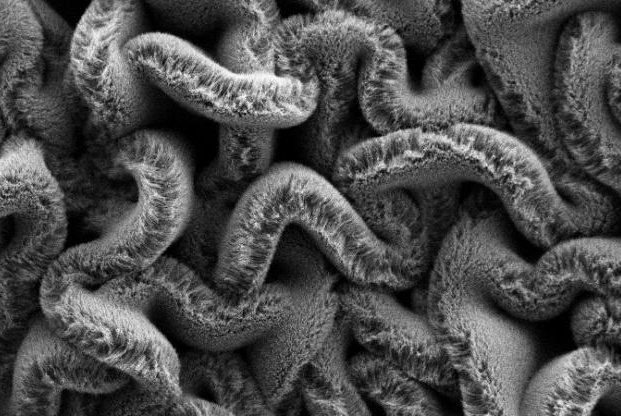When carbon nanotube forests are placed on an elastomer substrate pre-stretched in two directions, it creates a maze of spaghetti instead of rows, improving the stretchable supercapacitor's performance. Photo courtesy of Duke University
March 19 (UPI) -- Duke University and Michigan State researchers said Thursday they have engineered a new type of supercapacitor for wearable electronics that remains functional after being stretched eight times its original size.
Researchers envision the supercapacitor being used as part of a flexible electronic system for wearable electronics or biomedical devices.
The novel type of supercapacitor they've designed, outlined in the a study published Thursday in the journal Matter, can be stretched repeatedly without any wear and tear and largely maintains energy performance after 10,000 cycles of charging and discharging.
A supercapacitor stores energy through charge separation and cannot create its own electricity, so it must be charged from an outside source, and is unlike a battery, which stores energy chemically and generates charges through chemical reactions.
Also, unlike batteries, supercapacitors charge and discharge much faster, and tolerate many more charge and discharge cycles than rechargeable batteries.
"Stretchable supercapacitors have received tremendous research interest in recent years because of their ability to serve as independent and conformal power sources for stretchable electronics, biointegrated electronics, and wearable electronics," researchers wrote in the study. "Nanomaterials including metal, carbon, pseudocapacitive polymer, MXene, and metal oxide have been utilized to fabricate these kinds of devices. In particular, stretchable supercapacitors made from carbon nanomaterials are very promising and have been widely explored due to their low cost, high surface area, and long cycle lifetime."
In particular, crumpled carbon nanotube, or CNT, forest electrodes have been explored recently to fabricate extremely stretchable supercapacitors.
Researchers said they deposited a thin layer of gold film on top of the CNT forest. The gold layer dropped the resistance of the device, allowing it to charge and discharge much faster.
The CNT forest was transferred to a pre-stretched elastomer substrate with the gold-side down. Then, a gel-filled electrode was relaxed to allow pre-strain release that caused it to shrink to a quarter of its size. The process crumpled the thin layer of gold, which increased the charge it could hold, according to the study's senior author Jeff Glass, a Duke engineering professor.
The gold-modified CNT forest improved performance under large mechanical strains in charge/discharge rates.
"Although many nanomaterials and strategies are proposed to fabricate durable devices that can survive under large strains, they are suffering from the issues of robustness and low performance under large strains," researchers said. "Here, we successfully fabricated a robust and high-performance stretchable electrode and suprecapacitor via the crumpled Au-CNT forest."
"Our goal is to develop innovative devices that can survive mechanical deformations like stretching, twisting or bending without losing performance," said senior author and MSU engineering professor Chanyong Cao. "But if the power source of a stretchable electronic device isn't stretchable, then the entire device system will be constrained to be non-stretchable."
"We still have some work to do for building a complete stretchable electronics system," Cao added. "But with this foundation of a robust stretchable supercapacitor, we will be able to integrate it into a system that consists of stretchable wires, sensors and detectors to create entirely stretchable devices."















